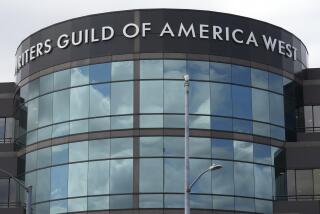Urgent Action Sought on Piracy
- Share via
WASHINGTON — Alarmed by rampant online pirating of music and videos, Hollywood executives urged Congress on Thursday to set a deadline that would force the bickering entertainment and electronics companies to develop an anti-piracy standard--before the government does it for them.
Walt Disney Co. Chairman Michael Eisner and News Corp. President Peter Chernin told the Senate Commerce Committee that their industry is losing money to unscrupulous Internet users and professional thieves who can make perfect digital copies of digital TV, film, music and other works at the click of a computer mouse.
“The pressure of a timeline for eventual government action is critical to getting the private sector to do what is needed,” Eisner told the panel.
Sen. Ernest F. Hollings (D-S.C.), the committee’s chairman, has proposed setting a date by which Congress would require digital device makers to install government-approved anti-copying technologies. The government standard would go into effect if industry executives fail to agree on an alternative protection scheme.
The Capitol Hill battle over a digital anti-piracy technology is the latest fallout from Napster and other computer file-sharing services, which have allowed Web surfers to copy music and videos for free.
Experts estimate that more than 1 million movie files are copied daily online. The problem has mounted with the spread of personal computers and a federal government mandate that the nation’s broadcasters transition to a digital broadcast system by 2003.
But finding a solution has not been easy, given that computer users can make perfect digital copies of films and music and zap them to millions of people around the world over the Internet.
For starters, the entertainment and technology industries are bitterly divided over whether to give consumers or producers the power to decide what can and cannot be copied digitally. For years, consumers with analog equipment such as audio and videotape recorders have had the freedom to make personal copies of albums and videos.
The consumer electronics industry argues that overly restrictive digital anti-piracy methods could thwart innovation and dampen the consumer market for digital fare. But entertainment companies insist the protection is needed and have pushed without success for more control over digital works.
“Negotiations are at an impasse,” News Corp.’s Chernin told the Senate committee. “If we cannot arrive at a voluntary industry consensus very soon, broadcasters will be forced to ask for legislation.”
Legislation may not be a panacea, however. Many technology experts believe it is virtually impossible to develop a mass-market digital anti-piracy technology that can’t be defeated by computer experts or hobbyists.
“The perfect copy protection technology doesn’t exist,” said Edward W. Felten, a computer science professor at Princeton University. Felten, who attended Thursday’s hearing and is an expert on anti-piracy technologies, said the Internet and personal computers are so flexible that they can be easily modified to circumvent most digital anti-copying methods.
If an accord between Hollywood and Silicon Valley is reached, entertainment executives said they would be more willing to supply high-quality digital fare. Experts say that would help accelerate adoption of two key Information Age technologies: high-speed Internet access and digital television.
But many consumer groups as well as some politicians, oppose a government-mandated anti-piracy standard, saying it could erode long-held consumer rights--such as privacy and the fair use of copyrighted material.
“Copy protection must be effective ... but it must permit consumers to continue to make recordings for their personal use within their homes just as they have come to expect in the analog world since the advent of the VCR,” said written testimony by James E. Meyer, an executive with Thomson Multimedia, RCA’s parent company.
More to Read
The biggest entertainment stories
Get our big stories about Hollywood, film, television, music, arts, culture and more right in your inbox as soon as they publish.
You may occasionally receive promotional content from the Los Angeles Times.










